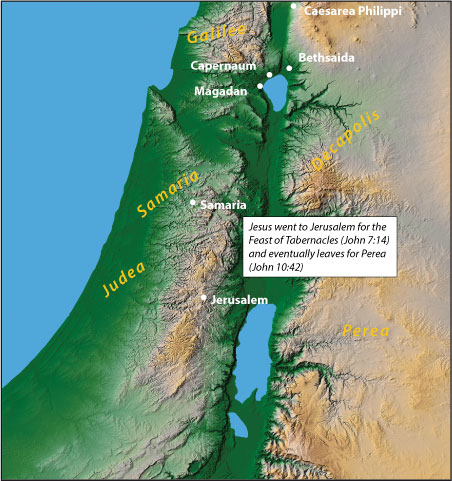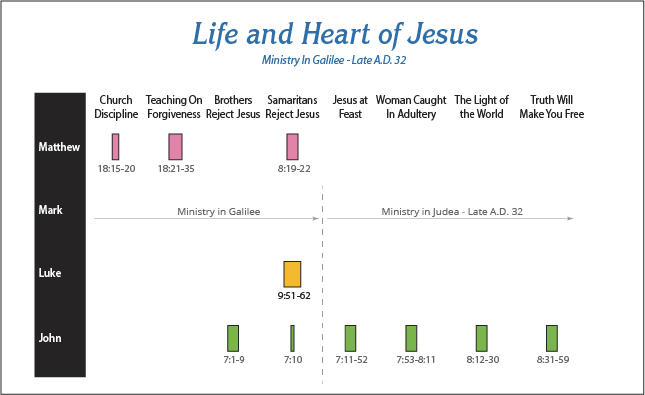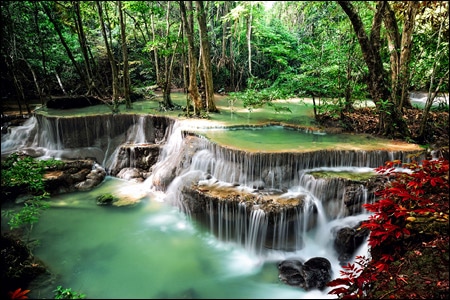One of the great tragedies among those who attend church is that not everyone who claims to be a Christian is truly a Christian. That is the message of Jesus’ parable about the tares and the wheat (Matthew 13:24-30, 36-43). In that parable Jesus taught that tares are sown in the field among the wheat by the devil (Matthew 13:39). The wheat symbolized real Christians. The tares symbolized non-Christians, but they looked like the real thing – real Christians. That is, some people can appear to be very godly – like the real thing. What is worse is that some folks think they are Christians because they have good morals. That truth is revealed by Jesus in Matthew 7:21-23 where He declares that at the Great White Throne judgment some individuals will claim that they should be allowed to enter heaven because they had done various religious things: prophesied, cast out demons and performed miracles. That is, they thought they were Christians, but they were just tares headed for hell and eventually the Lake of Fire. Unfortunately, some of the wheat also worry that they are tares. Which are you?
Some Wheat Worry
Some wheat or real Christians worry that they are going to hell because they are struggling with sin and their life is empty, shallow and unfulfilling. They cannot understand why that is true.

This is also true of tares who sit in church and hear about happiness but experience no victory or real joy. Sometimes biblical counselors wonder if the person they are counseling is actually a tare and that is why their life is such a mess. That is, they cannot access God’s power to live the Christian life in order to have victory over sin (Galatians 5:16; 1 John 2:13) and have the peace and joy that Jesus promised (John 14:27; 15:11).
Unfortunately, both tares and any wheat that has committed what they consider to be a great sin or continuing sin will experience disappointment and unhappiness. Some cannot understand why. It is a sad but real truth that churches could spend all of the money that God gives them to hire full-time counselors to help such tares and sinning wheat and there would still be a demand for more counselors. The promise of peace and joy is elusive for too many.
In this study (John 7:37-39) Jesus makes a profound statement. He states that anyone who comes to Him and believes in Him will feel like they have rivers of living water flowing out of their inside. That is, they will never be thirsty again and will feel satisfied. Wow! What a promise. Our study is about Jesus’ promise of living water to anyone who wants it.
Woman At the Well
Earlier in the gospel of John we are told that Jesus had stopped at the water well in the region known as Samaria. While He was there a woman approached (John 4:7-38). What followed was wonderful and memorable. Brilliantly Jesus asked, “Give Me a drink.” He was all alone with the woman since His disciples had left to buy food. The woman was surprised that He had spoken to her since Jews ignored Samaritans. But she did not know that her God was speaking to her. After she expressed her surprise, Jesus replied with this,
“If you knew the gift of God, and who it is who says to you, ‘Give Me a drink,’ you would have asked Him, and He would have given you living water.” John 4:10 (NASB)
Wow, living water! What a great phrase to capture her attention and also a great truth. But what did Jesus mean by living water? He gave her some hints with another statement.
Jesus answered and said to her, “Everyone who drinks of this water will thirst again; but whoever drinks of the water that I will give him shall never thirst; but the water that I will give him will become in him a well of water springing up to eternal life.” John 4:13-14
The Greek word that Jesus used for “well” is page and its primary meaning is a flow, spring or fountain of water. The word “springing up” comes from the Greek word allomai, which means “leap, gush or bubble.” That is, the water He referred to was not the plain, every day water but a spring of water that would bubble up into eternal life. Jesus was talking about eternal life in all of its satisfaction and fullness. The stream of living water would be never ending. Let me share the meaning of “never” in verse 14. At first, would appear that this word is rather simple, but it isn’t. Our English word “never” is translated from five Greek words. A literal English translation is “no not into the ages” and not simply “never.” But “never” is exactly what those five words mean, but only stronger. What Jesus said was that those who drink his water will “never, never” thirst again throughout the age, our age. He was talking about a deep satisfaction that accompanies eternal life. This must have been a surprising statement to her – a deep satisfaction to the end of her life. But scripture does not record if Jesus told her how she could get that living water. For us, this comes later in His ministry.

In Capernaum
Some months later Jesus was walking along the shore of the Sea of Galilee near the city of Capernaum. He was engaged in conversation with some of the people. Once again He declared that if anyone came to Him, they would never hunger and never thirst.
Then they said to Him, “Lord, always give us this bread.” Jesus said to them, “I am the bread of life; he who comes to Me will not hunger, and he who believes in Me will never thirst. John 6:34-35 (NASB)
In this statement of Christ, the word “not” is translated from a double negative in the Greek and the word “never” comes from two Greek double negatives plus a word that means “ever.” Literally, Jesus said, “not, not ever.” The double negatives added emphasis. Jesus is once again promising that those who believe in Him will never, ever thirst again. This is a very strong claim. Jesus was not talking about physical water but spiritual water or eternal life. That is, once a person comes to Jesus and obtains eternal life, they will never ever lose eternal life.
Feast of Tabernacles
Then about four months later, Jesus left the city of Capernaum where He and His family lived and went down to Jerusalem for the Feast of Booths, Tabernacles or Sukkot. Our study is about the last day of this feast and what Jesus did on that day.
The feast was mandated in Leviticus 23:39-44. The Mosaic Law required that the feast occur on the fifteenth day of the seventh month of the Jewish calendar (September or October). The feast lasted eight days.[1] On the first day the Jews sacrificed thirteen bulls and reduced the number of bulls by one each day until the seventh day. That means only seven bulls were sacrificed on the seventh day. The eighth day of the feast was the “Great Day of the Feast.”[2] It was a day of special observance. On this day the pilgrims held palm branches in their right hands and branches from fruit trees in their left hands. Before the morning sacrifice occurred, the priests played their trumpets and a processional left the temple. The processional was led by a priest who held an empty water pitcher. The processional moved down into the Kidron Valley to the Pool of Siloam. There the lead priest filled his water pitcher from the pool. The pool was supplied by a running water spring. Alfred Edersheim called it a “living spring.”[3]
Then the processional returned to the temple and arrived just before pieces of the burnt offering were laid on the altar. When the processional entered the “Water-Gate” on the south side of the Temple, three blasts of the priests’ trumpets were heard. Then the priest with the water pitcher poured the water from his pitcher into a silver funnel which placed the water at the base of the altar. Simultaneously another priest poured wine into another silver funnel and the water and wine were mixed at the base of the altar. This was the high point of the ceremony. Then the Great Hallel (Psalm 113-118) were chanted. Flutes played, the priest read the psalms and the people repeated the psalms. One of the ancient rabbis wrote: “Anyone who has not seen this water ceremony has never seen rejoicing in his life.”
Most likely Jesus announced that He offered living water to anyone who believed in Him at the very moment that the priests poured the water from the Pool of Siloam into the silver funnel which then cascaded down to the base of the altar where the pieces of burnt offering were to be sacrificed. It would have been a fabulous moment. Here is Jesus’ statement.
Now on the last day, the great day of the feast, Jesus stood and cried out, saying, “If anyone is thirsty, let him come to Me and drink. He who believes in Me, as the Scripture said, ‘From his innermost being will flow rivers of living water.’” John 7:37-38 (NASB)
Living Water Through Jesus
When Jesus made this announcement, He revealed four truths. The first truth is that we can only find satisfaction in Jesus Christ. No one else has this living water. This was Jesus’ message throughout His earthly ministry. In John 3:36 He clearly claimed that He and He alone was the only way to heaven.
He who believes in the Son has eternal life; but he who does not obey the Son will not see life, but the wrath of God abides on him.” John 3:36 (NASB)
Later in His ministry He said it again after John 3:36,
Jesus said to him, “I am the way, and the truth, and the life; no one comes to the Father but through Me.“ John 14:6 (NASB)
This was the message of Acts 4:12 of the apostles in the book of Acts.
And there is salvation in no one else; for there is no other name under heaven that has been given among men by which we must be saved. Acts 4:12 (NASB)
Jesus’ first point on the eighth day of the feast was simple. Salvation is exclusively through Jesus Christ and only Jesus Christ. Believing in anyone else does not result in living water flowing from the inside to the outside of any person.

Jesus’ second truth statement was that coming to Jesus means that we will believe in Him. One must believe in Him. He had already claimed to be God and He will be the judge of every man and woman at the end of the age (John 5:18, 26-27). In John 6:1-14 He performed a stunning miracle when He created food for 5,000 people out of five barley loaves and two fish (John 6:9). Imagine people watching Him multiply food from the bread and fish. Then He walked on water. These were miracles that only God could have produced. Later in John 8:58 and 10:36 He will state that He is God. Believing in Him also means that we believe Jesus came to die in order to forgive our sins and that He would be resurrected physically with an immortal body (1 Corinthians 15:1-6).
Jesus’ third truth was that those who believed in Him would have streams of living water gushing from their insides to the outside. This is a picture of salvation or eternal life in its fullness. The next verse explains this important fact.
But this He spoke of the Spirit, whom those who believed in Him were to receive; for the Spirit was not yet given, because Jesus was not yet glorified. John 7:39 (NASB)
Jesus’ figure of speech symbolizes the presence of the Holy Spirit in the life of a Christian resulting in deep spiritual satisfaction – inner peace (John 14:27; Rom. 5:1), joy (John 15:11), and the other fruits of the spirit (Gal. 5:22-23). Jesus was talking about victory over sin and the joy and blessings that victory brings (Galatians 5:16; Ephesians 5:18-20). To anyone who is depressed, despondent, discouraged or disheartened, this is an unbelievable offer.
Jesus’ fourth and last point is that those who believe will never thirst again. This statement means never ever again. It is a promise that is good for the rest of your life. Jesus reveals that a Christian is promised eternal life forever. It is a promise from our God who never lies (Numbers 23:19; Titus 1:2; Hebrews 6:17-18). Joshua 21:45 and Isaiah 14:24 tell us that God keeps His promises and His plans come true. John 14:6 also reveals that Jesus never lies and keeps His promises. Jesus is the truth. Therefore we can trust that once we come to Jesus and truly believe in Him, we have eternal life forever.
Conclusion
What an incredible offer. He promised salvation in its fullest sense and it will last forever. The promise rests on the truthfulness and integrity of God. Our God is loving, gracious, faithful and a promise keeper. So do you want spiritual satisfaction? Do you want your sins forgiven and have eternal life? Eternal life is not something that starts when you die. It starts when you are given the living water. God has promised eternal life and it can start right now!
This living water comes in response to faith and the evidence of real faith is submission to God. R. Kent Hughes illustrates this truth with,
How are we to drink this water? Although the offer is free and open to all, yet there are some terms to be met. C. S. Lewis in his children’s novel The Silver Chair puts his finger on this in the clearest of terms. Jill, seeing a lion, is scared out of her wits and runs into the forest. She runs so hard that she wears herself out and is just about to die of thirst, or so she thinks, when she hears the gurgling of a brook in the distance. She approaches it and is almost ready to go to the brook when on the grass before her is the same lion.
“Are you not thirsty?” said the Lion.
“I’m dying of thirst,” said Jill.
“Then drink, “said the Lion.
“May I – could – would you mind going away while I do?” said Jill.
The Lion answered this only by a look and a very low growl. And as Jill gazed at its motionless bulk, she realized that she might as well have asked the whole mountain to move aside for her convenience. The delicious rippling noise of the stream was driving her nearly frantic.
“Will you promise not to – do anything to me, if I do come?” said Jill.
“I make no promise,” said the Lion.
Jill was so thirsty now that, without noticing it, she had come a step nearer. “Do you eat girls?” she said.
“I have swallowed up girls and boys, women and men, kings and emperors, cities and realms,” said the Lion. It didn’t say this as if it were boasting, nor as if it were sorry, nor as if it were angry. It just said it.
“I daren’t come and drink,” said Jill.
“Then you will die of thirst,” said the Lion.
“Oh dear!” said Jill, coming another step nearer.
“I suppose I must go and look for another stream then.”
“There is no other stream,” said the Lion.
It never occurred to Jill to disbelieve the Lion – no one who had seen his stern face could do that – and her mind suddenly made itself up. It was the worst thing she had ever had to do, but she went forward to the stream, knelt down, and began scooping up water in her hand. It was the coldest, most refreshing water she had ever tasted.
Do you see what Lewis is saying? When you come to the water, you are coming to a Lion, you must come on the Lion’s terms, and you have to yield yourself by faith in order to get the water. Some of us need to realize that we are thirsty, that we need that water so badly that we are going to die without it. We need to step out on faith, yielding to the Lion of the tribe of Judah, and receive the water of eternal life.[4]
So, let God know that you are a sinner, you believe He died for your sins and that you desperately want Him to forgive you and take over your life and change you. He will do that if you are really serious. You will receive the living water that Jesus promised.
References:
1. Josephus. Antiquities of the Jews . 13.245; b. Sukkah 48b; m. Sukkah 5:6; 2 Maccabees 10:16.
2. Alfred Edersheim. The Life and Times of Jesus The Messiah. W. B. Eerdmans Publishing Co. 1973. vol2, pp. 156-162.
3. Ibid. p. 158.
4. Hughes, R. K. (1999). John: that you may believe. Preaching the Word (pp. 216–217). Wheaton, IL: Crossway Books.